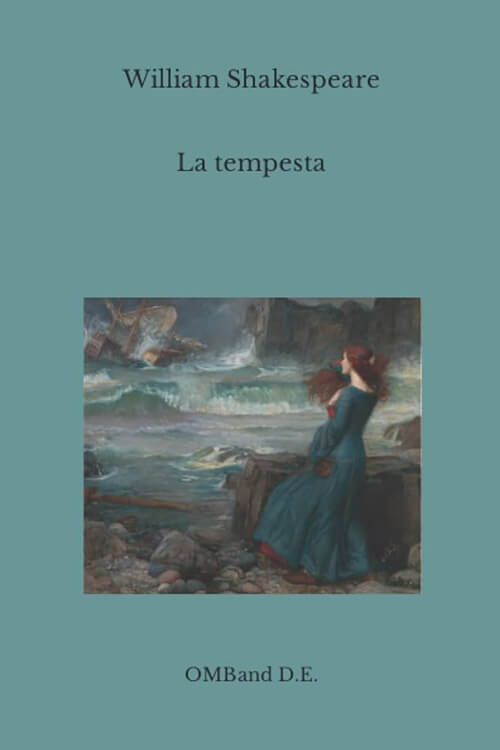
La Tempesta
A story of shipwreck and magic, The Tempest begins on a ship caught in a violent storm with Alonso, the king of Naples, on board. On a nearby island, the exiled Duke of Milan, Prospero, tells his daughter, Miranda, that he has caused the storm with his magical powers. Prospero had been banished twelve years earlier when Prospero’s brother, Antonio—also on the doomed ship—conspired with Alonso to become the duke instead. Prospero and Miranda are served by a spirit named Ariel and by Caliban, son of the island’s previous inhabitant, the witch Sycorax. On the island, castaways from the wreck begin to appear. First is Alonso’s son Ferdinand, who immediately falls in love with Miranda. Prospero secretly approves of their love but tests the pair by enslaving Ferdinand. After secretly watching Miranda and Ferdinand exchange vows, Prospero releases Ferdinand and consents to their marriage.
Other castaways who appear are Trinculo and Stephano, Alonso’s jester and butler, who join forces with Caliban to kill Prospero and take over the island. The nobles from the ship search for Ferdinand and are confronted with a spectacle including a Harpy, who convinces Alonso that Ferdinand’s death is retribution for Prospero’s exile.
Having all his enemies under his control, Prospero decides to forgive them. Alonso, joyously reunited with his son, restores Prospero to the dukedom of Milan and welcomes Miranda as Ferdinand’s wife.
As all except Caliban and Ariel prepare to leave the island, Prospero, who has given up his magic, bids farewell to the island and the audience.
Read or download Book
William Shakespeare
William Shakespeare (April 1564 – 23 April 1616) was an English playwright, poet, and actor.
Biography.
He is widely regarded as the greatest writer in the English language and the world’s pre-eminent dramatist. He is often called England’s national poet and the “Bard of Avon” (or simply “the Bard”). His extant works, including collaborations, consist of some 39 plays, 154 sonnets, three long narrative poems, and a few other verses, some of uncertain authorship. His plays have been translated into every major living language and are performed more often than those of any other playwright. Shakespeare remains arguably the most influential writer in the English language, and his works continue to be studied and reinterpreted. Shakespeare was born and raised in Stratford-upon-Avon, Warwickshire. At the age of 18, he married Anne Hathaway, with whom he had three children: Susanna, and twins Hamnet and Judith.
Sometime between 1585 and 1592, he began a successful career in London as an actor, writer, and part-owner (sharer) of a playing company called the Lord Chamberlain’s Men, later known as the King’s Men. At age 49 (around 1613), he appears to have retired to Stratford, where he died three years later. Few records of Shakespeare’s private life survive; this has stimulated considerable speculation about such matters as his physical appearance, his sexuality, his religious beliefs, and whether the works attributed to him were written by others. Shakespeare produced most of his known works between 1589 and 1613. His early plays were primarily comedies and histories and are regarded as some of the best works produced in these genres. He then wrote mainly tragedies until 1608, among them Hamlet, Romeo and Juliet, Othello, King Lear, and Macbeth, all considered to be among the finest works in the English language. In the last phase of his life, he wrote tragicomedies (also known as romances) and collaborated with other playwrights. Many of Shakespeare’s plays were published in editions of varying quality and accuracy during his lifetime. However, in 1623, John Heminges and Henry Condell, two fellow actors and friends of Shakespeare’s, published a more definitive text known as the First Folio, a posthumous collected edition of Shakespeare’s dramatic works that includes 36 of his plays. Its Preface was a prescient poem by Ben Jonson, a former rival of Shakespeare, that hailed Shakespeare with the now famous epithet: “not of an age, but for all time”.






